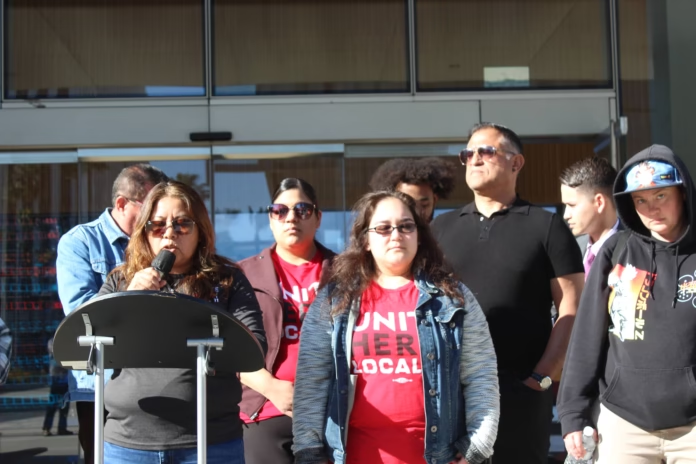By Daniel Rivera, Labor Reporter
On April 1, members of UFCW 324, alongside community members, gathered at Long Beach City Hall to comment in support of a proposal meant to regulate self-checkout and provide more employment.
“I think we, and certainly the workers who work in grocery and drug retail, have recognized that there for some time that there’s a problem”, said Derek Smith, Political Director for 324, told Random Lengths News. That problem, he says, was created by self-checkout, by the absence of working employees, which has led to increased theft.
“Item 23(proposal) is trying to increase staffing for self-checkout stations under the guise of public safety concerns,” Celeste Wilson, Government Affairs manager for the Long Beach Area Chamber of Commerce. She explains that the companies should be hiring security guards instead since employees are usually not allowed to interfere with shoplifters. However, the union states that simply having their presence can deter theft.
“The problem is inordinate amounts of theft that are happening, which I think all of us know to some degree, and that the vehicle by which people are stealing things are invariably is self-check,” Derek continued.
In recent years, companies like Costco and Trader Joe’s pulled back it self checkout in response to rising thefts.
It goes beyond the security issues presented by the lack of oversight, but the also calls attention to the diminishing customer experience and lack of flexibility. The union is proposing that not only should there be ideally one cashier per two self-checkout ratio, but also have workers dedicated to watching the self-checkout and assisting customers.
“And if you have a checker there for every two and then someone to help the customers that are on self-checkout, that’s better because… alcohol and stuff like that can’t go through self-checkout,” Shamiko Pekoe, a food clerk at Von’s for about 24 years explained when discussing having to juggle being a cashier, helping on the self-checkout and providing other services necessary to the store.
According to a report from Capital One, self-checkout remains very popular, with about 73% of shoppers preferring it to a cashier.
However, understaffing has remained widespread across numerous industries, years after the pandemic prompted closures and layoffs, and has yet to fully recover to pre-pandemic levels, placing a large strain on workers.
Self-checkout, accordingly, has led to increased losses across the industry. According to a report, self-checkout is about 10 times more likely to be robbed than traditional checkouts, even though it’s slated to grow from 2 billion to about 4 billion in the following year.
However, many of these are accidental, according to the survey, as much as 21% due to various user errors like not scanning an item properly, mis-weighting, faulty barcodes, and a whole variety of troubleshooting and problem-solving that was once left up to a trained cashier to handle.
Over the last few years, since the pandemic, several corporations have reported a rise in shoplifting, from the casual to the large-scale viral shoplifting phenomenon, which has led to some shuttering their operations in California.
These shutterings have left communities in food deserts, pulling away vital services and products in part due to the rising theft.
However, activists and business people argue over the solution, which in this case is either more employee eyes or more security and harsher sentencing. Wilson explained that Proposition 36 was only recently passed, and we should wait for the law to have its intended effect.
Prop 36, among many things, adds a three-strike policy as punishment for repetitive shoplifting charges, and those include charges for shoplifting under $950 worth of merchandise. However, three three-strikes laws have been heavily criticized in the past for their contribution to recidivism and disproportionate effect on communities of color.
However, the activists think that the more eyes cover an area, the less likely they are to steal by sheer presence, while also providing jobs and improving customer experience. However, there isn’t a clear relationship between floor presence and theft.
To keep up with Daniel’s work, follow him on IG!



